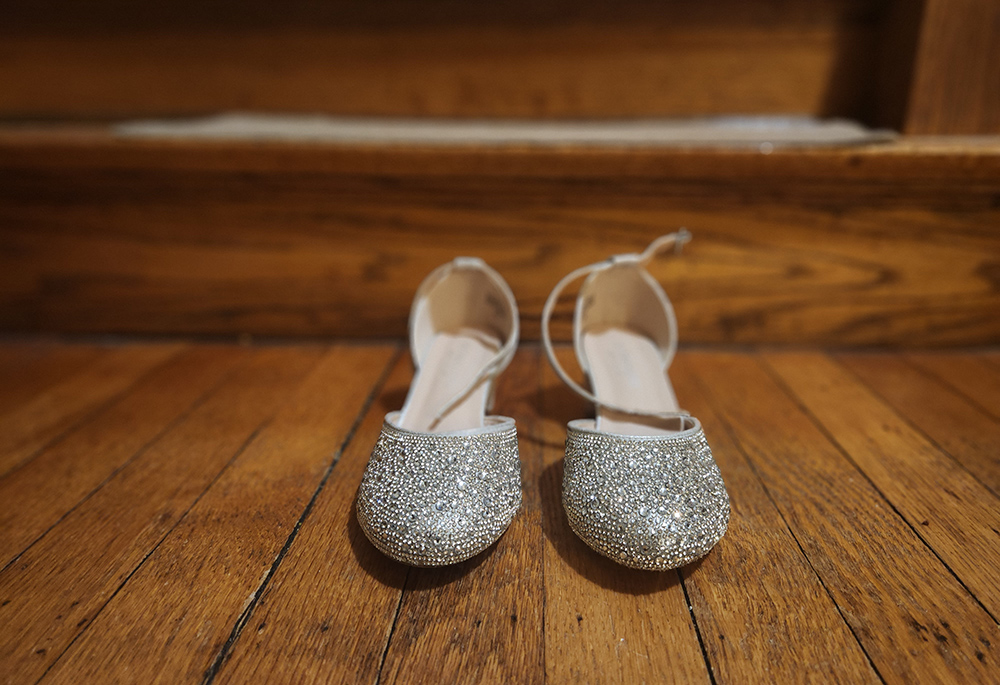
The shoes that the author's daughter will be wearing for her first Communion (Mark Piper)
Look down at your shoes, I thought to myself.
My daughter, Rachel Day, was decked out in her first Communion attire: pristine white dress, neatly kept veil and silver shoes that looked both beautiful and uncomfortable. Her cohort had been invited to have their portraits taken professionally at church in advance of the big day and she was ready, head to (very sparkly) toe.
My own cheap black dress shoes paled in comparison, I realized as I looked down at my feet and then back at my daughter's. A few images popped into my mind, images of both souls and soles.
A few years ago someone showed me a picture of a pair of shoes that had belonged to St. Ignatius of Loyola. They appeared to be leather and well worn. These shoes struck me as similar to the sandals that Jesus and his early disciples might have worn on their journeys: practical, average in appearance, but as durable as they were unremarkable.
In the Gospel of John, John the Baptist speaks of not being worthy to loosen the ties of the sandals of the one to come: Jesus. We know that this humility isn’t because of the expensive nature of Jesus' shoes, but because of the nature of the one wearing the shoes. In the journey of faith we are each called to take, it is about who we are and who we encounter, where we are and where we are going — and how God is in all of this tripping about!
In the journey of faith we are each called to take, it is about who we are and who we encounter, where we are and where we are going — and how God is in all of this tripping about!
Catherine McAuley also came to mind, for on her deathbed she not only ordered a directive to see that the sisters "get a good cup of tea," but she also asked that her old, tattered boots be tossed into the fire.
The ragged state of her shoes might have embarrassed McAuley, but their wear was easily explained in her writing: "Mercy [is] the principal path pointed out by Jesus Christ to those who are desirous of following Him." She knew this because she walked the path of discipleship every day.
In those boots, she had started a home for those in need on Baggot Street in Dublin, Ireland, in 1827. Women who shared her vision ran the house. Eventually, this led to her founding the religious order whose members would be called "the walking nuns." Set by her example, the Sisters of Mercy walk among the people carrying out the mission of mercy by serving all, but especially the poor, sick and uneducated.
Advertisement
Around the same time, but in a different part of Europe — 1826 Lalouvesc, France — St. Therese Couderc co-founded the Congregation of Our Lady of the Retreat in the Cenacle (Cenacle Sisters). The congregation began by providing both safe lodging for women pilgrims as well as catechetical instructions with an emphasis on the Spiritual Exercises of Ignatius of Loyola.
As with McAuley's deathbed request, footwear curiously comes up from Couderc as well, who said, "What does it matter if my feet, bare and torn, fill my wooden shoes with blood? I would willingly begin my journey all over again, for I have indeed found the Good God!"
My daughter's glimmering dress shoes were not made of wood, but neither of us had shoes fit for a long journey. Our shoes just weren't practical for a literal going out to do the work of Gospel, and that's rather interesting since these were the shoes we both planned on wearing for her first holy Communion.
I thought of suggesting a change of shoes, something more symbolic for this rite of initiation, this commitment to follow Jesus and of being sent out into the world. But I suspected my daughter, her grandmothers and my wife wouldn't approve of sturdy boots for this occasion, regardless of their symbolism.
At my daughter's first Communion this weekend, I suspect I will look down at our shoes once again. I hope this sacrament will be a memorable milestone on her path of following Jesus Christ. And should she choose — as I pray she will — to grow with Christ in wisdom, age and grace, then I suspect that much like Catherine, she'll find the path of God's mercy an arduous but beautiful choice for this life. Like Therese, I hope my daughter's spirit of determination continues in the face of whatever difficulties lie along the way. And like Ignatius, I hope she can see God in all things and that her travels bring her to the people and places where she needs to be present, where she may find God in all people and, now, in the Eucharist.





